 Petzlover
PetzloverFinnish Hound is originated from Finland but Russian Setter is originated from Russia. Finnish Hound may grow 6 cm / 2 inches shorter than Russian Setter. Finnish Hound may weigh 7 kg / 15 pounds lesser than Russian Setter. Both Finnish Hound and Russian Setter has almost same life span. Both Finnish Hound and Russian Setter has same litter size. Finnish Hound requires Low Maintenance. But Russian Setter requires Moderate Maintenance
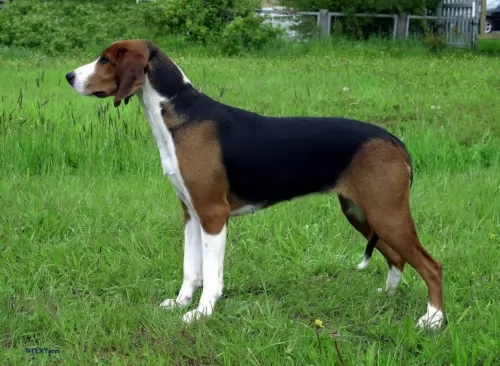 As one of Finland’s most popular dogs, the Finnish Hound isn’t particularly well known outside of Finnish borders. Known also as the Finsk Stovare, the Finnish Hound, known for its hunting skills, came about because of a breeding effort which started way back in the 1800s, mixing dogs such as different French, Swedish, and German hounds.
As one of Finland’s most popular dogs, the Finnish Hound isn’t particularly well known outside of Finnish borders. Known also as the Finsk Stovare, the Finnish Hound, known for its hunting skills, came about because of a breeding effort which started way back in the 1800s, mixing dogs such as different French, Swedish, and German hounds.
These hounds were used with the idea being to develop a dog that could do well in Finland’s terrain. The Finnish Hound is a great hunting dog but isn’t looked upon as an particularly awesome pet, although some pet owners would beg to differ.
People often think it is ridiculous that a Setter dog comes from Russia. It is believed that the Russians did have some kind of Griffon and the word Pointer is also often translated as Setter.
It is believed that the Russian Setter is one of the ancestors of the Wire-haired Pointing Griffon and that it possibly shared an ancestry with the German wire-haired and broken-haired pointers.
References to Russian Setters were fairly common in the 19th century, but there is such contradictory information that it is hard to get good information on the dogs. The Russian Setter is believed to have existed before the Russian Revolution resembling the English Setter. Dog experts tell us the dog no longer exists.
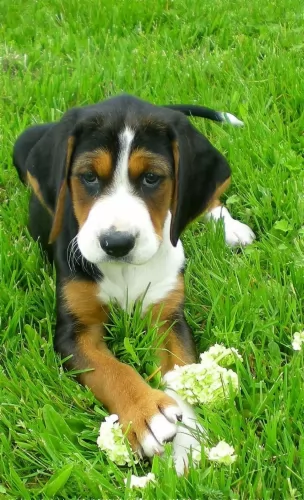 This is a medium sized dog who stands between 52 – 62cm in height and weighs in at 20 to 25kg. The Finnish Hound can have between 4 – 8 puppies.As a scent-hound, the Finnish Hound has a short, smooth double coat which is usually in a tri-color pattern of black, tan, and white.
This is a medium sized dog who stands between 52 – 62cm in height and weighs in at 20 to 25kg. The Finnish Hound can have between 4 – 8 puppies.As a scent-hound, the Finnish Hound has a short, smooth double coat which is usually in a tri-color pattern of black, tan, and white.
The attractive dog has an athletic, lean, muscular body full of energy and stamina. The eyes are brown and the dog has a peaceful expression. The medium length ears are floppy and the tail is long and carried low.
The Finnish Hound is friendly, calm and never aggressive. He is an intelligent dog nd will respond to the training and socialization he will require to turn him into an obedient, amicable pet, especially since he tends to be stubbon, independent and strong-willed. He isn’t recommended for small places in the city but will do better in the country with a fairy large piece of ground. The Finnish Hound is not recommended for apartment life. It is moderately active indoors and does best with at least an average-sized yard.
In terms of appearance, it was John Henry Walsh who said that the Russian Setter was a dog hidden by its long, woolly matted coat.It seems to have been a medium sized dog with an elegant appearance. It seems the dog came in two varieties - the curly coated liver coated dogs and the fawn colored dogs which are straight coated.
Because there is very little information on these dogs, we assume they were between 57 – 68cm in height and between 27 and 32kg in weight. The coat was no doubt in colours such as grey, reddish-brown with some black and white and shortish and wiry. The ears were floppy,and the face no doubt had some longer hair around the muzzle.
Nobody seems to know exactly what the temperament of this dog was, but when you look at some of his ancestors you can assume that he was strong-willed, confident and a skilled hunter.
He would have required a lot of exercise too. He was lively and energetic. Because he had Pointer in him you can be sure that he would have been intelligent so that he could be trained and socialized.
He would have been keen to learn with an owner who was firm and consistent in his treatment of him. He is a dog most happiest when he can spend time with his human family, a most loyal and devoted family friend, capable of getting on well with children and pets in the home.
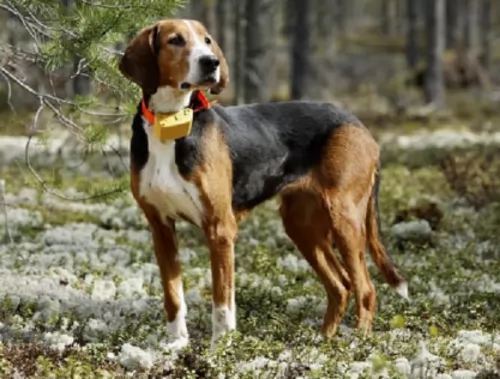 The Finnish Hound has always been a working dog and so he will require being well exercised.
The Finnish Hound has always been a working dog and so he will require being well exercised.
He makes a good pet with homes where there are other dogs as well as children. As a hunting or working dog, these days the Finnish Hound is also regarded as a companion animal, fitting into family life well, and turning out to be a loving, loyal pet.
It appears, according to records that the Russian Setter has come and gone. However he would have been a calm, gentle pet with running ad hunting keeping him happy. He would therefore have required a lot of exercise.
We can assume that according to the few records that there are, that this was an affable, pleasing dog breed which made a great family pet.
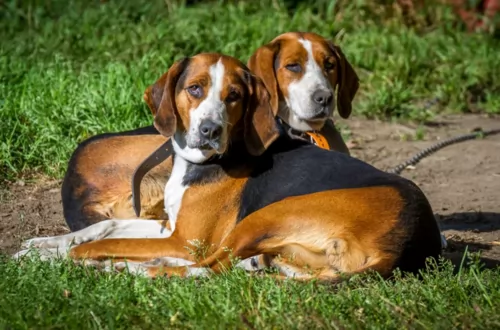 The Finnish Hound is looked upon as a generally healthy breed who can get to 12 years of age if looked after well. Good nutrition plays a huge role towards excellent health.
The Finnish Hound is looked upon as a generally healthy breed who can get to 12 years of age if looked after well. Good nutrition plays a huge role towards excellent health.
Check out common health ailments that can affect most dogs such as dental disease, obesity, hip dysplasia and a serious condition for which these dogs are particularly known – cerebellar ataxia. Lesions in the brain affect the dog’s coordination and sight. Get him to the vet as soon as you detect anything unusual with your pet.
The Russian Setter had an average lifespan of 10 – 14 which is a fairly good innings for a dog. Nonetheless you would have had to be aware of some common dog problem. These dogs were prone to major health issues such as both hip and elbow dysplasia, deafness, epilepsy and hypothyroidism.
The thyroid glands produce hormones that affect the function of many parts of the body. Dogs with this illness have a low production of thyroid hormones.
This disease is mainly caused by inflammation or shrinkage of the thyroid gland. The most common signs of low thyroid in dogs is thinning of the fur, the coat is dull, there is weight gain and excess shedding. The dog doesn’t tolerate cold well either. These dogs also often have ear infections.
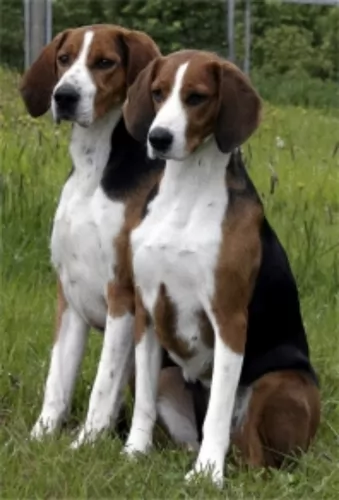 As a medium-sized dog breed, you want to make sure to feed your dog a high-quality commercial dog food – one that has been formulated with the right amount of vitamins and minerals for the type of dog he is.
As a medium-sized dog breed, you want to make sure to feed your dog a high-quality commercial dog food – one that has been formulated with the right amount of vitamins and minerals for the type of dog he is.
He is a high-energy hunting breed, so you wan to find a food that is appropriate to his needs. Home cooked brown rice, vegetables and chicken can be added into his kibble as a change and a treat from time to time as well as some raw meat occasionally. Make sure he always has access to fresh, cool water.
Physically active and mentally balanced and intelligent, the Finnish Hound will require both physical and mental stimulation to prevent him from becoming bored and frustrated.
As an average shedder, your pet's smooth, short-haired coat is easy to keep in tip top condition. All that is really required is to brush the coat down twice a week to keep it in peak condition.
Don’t neglect to check the inside of the dogs ears, as too much dirt and wax can cause nasty ear infections. Also, the teeth need to be brushed at least 2 or 3 times a week with special canine toothpaste and toothbrush. This will ward off tooth decay and lots of other problems within the body brought about by bad teeth.
Whatever kind of coat the Russian Setter ad it would have required a brushing twice a week to keep it in top form.
The medium length floppy ears would have to be checked inside for ear infection.
His owners would have checked inside the mouth for any signs of rotten or bad teeth.
His nails would have required trimming.
Dogs need the best food there is to stay healthy. The Russian Terrier, if it were still around today, would have had the best commercially manufactured food there was.
You want to provide dogs with some good homemade food too. Dogs thrive on simplicity and consistency to avoid upsetting the stomach. Some home-cooked food such as boiled chicken, sweet potatoes, brown rice or pasta, carrots and spinach would be perfect for him. Chop the food up finely and add it into the dry kibble once or twice a week. Raw meat should also be added in when possible to promote good skin health.
Make sure your pet is never without a constant supply of fresh, cool water.